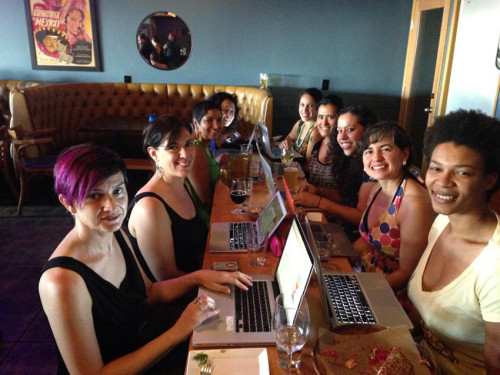Submission as Social Action
Once when I was in my early twenties, the tires on my car had gone bald, and my mother offered to take me to Sears to get replacements. At the time I didn’t even know the department store sold tires. And who still shopped there anyway? But my mom assured me that with a Sears credit card we could get a good discounted price. Having been a working mother of four for over thirty years, she knew more about this than me, and being a new teacher with few funds, I happily accepted her help.
“Will you be paying with a Sears card today, ma’am?” a boyish, blond cashier asked. My car sat on new tires just outside the automatic doors, keys in the ignition.
“I lost the card, but I can give you my ID.” My mother tugged at her license, stuck in a bulging wallet the shape of a brick, and handed over an ID that displayed the same address she has lived at since 1974. I wasn’t born until 1980, but 1974 is an important date in my family’s history because it is the year my parents moved from an apartment in Boyle Heights, a low-income neighborhood in East L.A., to their first and only house in San Gabriel, a sunny suburb ten miles east of Downtown Los Angeles and nestled below the San Gabriel Mountains. At the time, my oldest brother was only three and my mother was eight months pregnant with my second brother.
“I’m sorry, ma’am, but your name isn’t on this card,” the cashier said.
“That’s my husband’s name,” my mother said with a flick of her hand. My cheeks flushed because she never had patience for cashiers, phone tellers, or repairmen.
“But it’s not your name, ma’am, so I can’t take it,” the cashier said, looking nervous.
“Well, I wasn’t allowed to have a credit card when we got it,” she said matter-of-factly, and the skinny, reed of a cashier with loose blond hair and I shared puzzled looks.
“Mom, what do you mean you weren’t allowed to have a credit card?” I asked, confused.
“It’s an old card,” she sighed, “I never come to Sears. I don’t know, maybe I won’t come back.” She snatched her ID from the cashier and stuffed it back into her wallet, stuffing the wallet back into her over-filled purse that sat sprawled and gaping over the counter like a sinkhole.
“I’m sorry ma’am,” he said hurriedly, going back to the keys of the cash register, “I guess I can do it this once.” Within minutes the transaction was finished, and we were walking out sliding glass doors to my newly re-tired car.
It was a sunny afternoon. The San Gabriel Mountains created an impenetrable wall behind the parking lot that mirrored the walls I now imagined around my mother, walls I had never before considered.
“Mom, you couldn’t have a credit card?” I asked still dumbfounded.
“No. Back when we first got it, they would only let men have credit cards. I had to put it under your father’s name.” We climbed into the car.
“You put it under dad’s name?”
“Well, yeah. I applied for the card, but I couldn’t use my name. I had to use his.” She was short in her answers, and maybe still agitated by the cashier, so I silenced my questions, started the engine, and drove us home, just two women fixing a car.
Until that moment, I had never realized how close I was to a completely different reality from the one I lived. I was just one small generation away from living in a society that did not allow women to have credit cards, which meant they couldn’t buy their own cars or own property.
The car my mother helped me with was an army green 2004 Scion xB. It was my very first new car, and I bought it with a two thousand dollar down payment I saved from my first year of teaching high school English at a tiny private school in Arcadia. Like the car, the full-time job was a first too. When it came time to sign a loan, my mother agreed to cosign.
I remember sitting side by side at the banker’s desk, the contract laid out in front of us.
“Why are these numbers different?” I pointed to two places where the monthly payment did not match.
“The payments are scheduled for the fifteenth of the month, but today is the eighth. If we schedule payments for the eighth of the month, it won’t be different. Do you want that?” he asked me.
“Yes, let’s do that,” I said. After he made the adjustment, I signed, my mother signed, and then he took us out to the lot to show me my new car.
“You made me so proud, mija,” she said when we met back at home.
“How?” I asked.
“The way you looked over the numbers and asked questions. That made me very proud.” I never thought I was any different from her, but looking back now, I see it’s possible.
In 2011, I co-founded an organization with two other women called Women Who Submit. Our focus was to empower women writers to submit work for publication after VIDA: Women in Literary Arts began counting how many women were published in top literary journals and publications. What they found was no surprise. Compared to men, women were grossly underrepresented in the highest and most prestigious literary journals. When VIDA started asking editors why the numbers were so, the most common reply was, “women don’t submit as often men.” And many believed that statement because women are believed to be quieter than men, less aggressive, and yes, submissive.
When I think of submission and women, I never think of my mother. I think of grandmothers. I think of the 1950s’ kitchen. I think of a poster I once saw of a woman in nothing but an apron and holding a beer, next to a banner encouraging, “Know how to keep your man happy.” And even though my mother was born in 1947, I never thought of her living in that time. Maybe it is because my mother has never been the submissive type. In fact, she despises submissive women with their soft giggles and simple-minded pretenses. I was taught at an early age that I was just as strong and just as smart as boys, and I could never act otherwise. If my three older brothers could do it, so could I. Baseball, camping, twenty-mile bike rides to the beach, algebra summer school classes, if it was good enough for her boys, it was good enough for her girl.
In her own life, my mother worked full-time in Downtown L.A. offices as a secretary and clerk, but also took the jobs no one else wanted, like the office emergency manager—this person created the office emergency plans and scheduled earthquake drills. I never saw her do this job, but I imagine her wearing a hardhat and barking orders. At home, it was often me and my brothers’ responsibility to put dinner on the table and keep the house clean. This makes it sound like my father was not there, but he was. While my mother worked full-time and we were expected to keep the house, my father was allowed to follow his economic dreams and whims after he lost his job as a welder. There was a video rental store, a flower shop, a burrito stand, a party balloon business, a catering business, and weekends spent selling cowboy boots, serapes, and whatever goods my father could pick up on turnarounds to Tijuana at charreadas and banda concerts at the Pico Rivera Sports Arena. My mother worked Monday through Friday keeping the steady money coming in, but come Saturday she rose early to cook a vat of beans for burritos, or drove to the flower shop in East L.A. to bunch batches of white roses into prom corsages and boutonnieres. This was my first introduction to women’s work and gender roles, and from what I saw women could do anything because my mother did everything.
Women Who Submit was created with the idea that if we hosted submission parties—meet-ups for women writers in private homes where women could ask questions, gain support and resources, set goals, and submit work in real time—maybe more women would submit regularly, and maybe the numbers would change. Think 1950s’ Tupperware party, but instead of sharing products to improve our kitchens, we shared information to improve our chances of being published in the literary journals of our choosing.
Our first submission party was in July 2011, at my mother’s house in San Gabriel. Six women gathered around my mother’s kitchen table to create a lending library of literary journals, share food and drink, establish personal goals and submit work for publication. Every time a woman pressed “send” we cheered and clapped. And this is how the first submission party was born.
Soon after, we started to think of a name. I suggested “Ladies who Submit,” because it reminded me of “Ladies who Lunch” and thought it was a fun play on an activity seen as benign and shallow. But that got vetoed for Women Who Submit. I didn’t think much of the name at the time or the double entendre, until other women began to hear of us and make comments.
“Do you know what comes up when you Google Women Who Submit?” one woman prompted. When I tried, I found Bible versus, Christian sites, and the headline, “Submit to your Husband: Should Women be Submissive?”
Recently, our Facebook page received a message from a woman who was recommended to our site by a friend. She wrote: “I have to say, I was thrown by the name of the group. I lived through the ’50s …Cool idea…scary name.”
This statement made me realize that Women Who Submit is in fact the perfect name for our organization, because at its core it is a social action that helps women break free of societal boundaries caused by centuries of female submission.
Sometimes I think $0.77 to every dollar a man makes isn’t so bad. Sometimes I think 20% less representation in journal A isn’t so bad when journal B has equal representation. But then I think of my mother and how unbearably close it was that women couldn’t apply for credit cards, or own property, or work in an office without being harassed. The Clarence Thomas case took place in 1991, and it was only a short twenty-four years ago that the name Anita Hill and the term “sexual harassment” came into our public consciousness. And then I think of Juarez, Mexico where in the present day women are abducted and killed while on their way to work. And I think of those young women in Nigeria who were kidnapped from their beds and sold off because they wanted to go to school. And I think of women in Saudi Arabia being threatened with imprisonment and violence if they dare to drive.
Women Who Submit is a group of women who submit work for publication because they refuse to be marginalized. Through the support of community and resources we seek empowerment and equality in our chosen professions as writers, editors, and publishers. But more than that, it represents a voice for all women who refuse to be intimidated or silenced.
When I think of my mother, I think of her hard edges, her refusal to accept “no” and her ability to put her head down and do the dirty work. She’s a bulldozer, and I think maybe she got that way because no one else fought for her. No one else cheered her on. No one ever told her, “You made me so proud.”
Mom, you make me so proud!






